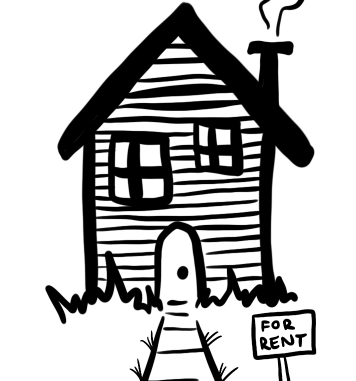
The pandemic has ended, but with freedom of movement came an end to New York state’s eviction moratorium and an increase in evictions. The Associated Press reported last June that New York and other places across the country have seen eviction rates rise far above pre-pandemic levels.
For current tenants, tenants who are being evicted, people looking to rent and landlords, understanding tenants’ rights is essential. Deputy Mayor Alexandria Wojcik coordinated with The Legal Services of the Hudson Valley (LSHV) to hold a presentation last Tuesday in the Student Union Building which covered the rights tenants are entitled to in the process of looking for a rental, signing a lease, and during eviction proceedings.
Patty Perez, attorney from LSHV, spoke to attendees about tenants’s rights as outlined in New York Real Property Law. Tenants hold a number of protections while searching for an apartment. Landlords cannot discriminate against a tenant and deny them an apartment on the basis of them belonging to a protected class: race, color, religion, national origin, sex, disability or familial status. Landlords also cannot discriminate because of a tenant’s lawful source of income, even if they receive income from government assistance. Tenant blacklisting has been illegal since 2019; landlords cannot use the appearance of a tenant’s name on a blacklist to justify denying them an apartment. There is a $20 limit on the fee a landlord can charge for a credit check, which can be waived if the tenant furnishes their own credit report. Landlords are prohibited from representing a unit as unavailable to a tenant when it actually is. The landlord may ask for a security deposit before the tenant moves in, but when the tenant leaves, the landlord has 14 days to make deductions to the deposit for repairs to the unit. According to the attorneys, the attorney general takes complaints about security deposit disputes.
Tenants have the right to heat, hot water and repairs to their unit, which cannot be signed to be waived on the lease. The apartment must conform to health and safety standards such as having smoke and carbon monoxide detectors. If the apartment is in need of repairs but the landlord does not make those repairs, the tenant can make a report to the building inspector. During these disputes, tenants are protected from retaliation.
Tenants have the right to have a roommate. If there is only one tenant on the lease, the tenant may share the apartment with immediate family members, one additional occupant and any number of dependent children. If there are two or more tenants on the lease, the apartment can be shared with the tenants’ immediate family members but no other additional occupants. Each occupant must have a certain number of square footage of space afforded to them. Additional occupants outside of the family cannot get succession rights.
Tenants have the right to rent receipts. If the tenant pays cash or deposits money directly into the landlord’s bank account, the tenant is entitled to rent receipts that may be used to defend against a non-pay eviction. The landlord must give a tenant five-day notice for a non-pay eviction. Attorneys from LSHV recommend to not pay rent with cash, and to make notations of money transfers through apps such as Venmo or Zelle that specify which month’s rent it is. According to the attorneys, notations like “December rent” can protect the tenant from the landlord using rent payments for things other than rent, such as late fees or utilities. Tenants can be evicted for being in arrears, but they cannot be evicted for owing money for things other than rent if the rent is paid. The landlord must give notice for a renewal of the lease or raising the rent: 30-days notice if the tenant has lived in the apartment for one year, 60-days notice if the tenant has lived there between one and two years and 90-days notice if the tenant has lived there for more than two years.
The attorneys stressed that tenants have rights during eviction. Unlawful evictions include the landlord using threats, physical force or employing strategies such as oppressive rules, loud noises or changing the locks. The attorneys advise tenants undergoing an unlawful eviction to call the police. If the tenant has been locked out or has been otherwise barred entry from their apartment, the landlord accumulates damages for the amount of time the tenant could not enter the unit.
Landlords must respect the judicial processes of holdover and non-pay evictions; failure to follow these rules can cause the case to be dismissed. A holdover eviction is an eviction due to a tenant staying after the expiration of a lease that has not been renewed. The landlord must give the tenant notice that the lease has not been renewed before conducting a holdover eviction.
A non-pay eviction is when a tenant is made to leave an apartment due to failure to pay rent. The landlord must demand rent from the tenant 14 days before non-pay eviction proceedings in court can begin. During eviction proceedings, the tenant will stand before a judge in court who will issue a judgment of a certain monetary sum which the tenant will have to pay; a 14-day warrant of eviction will also be issued. If the tenant pays the judgment any time in the 14-day period before the sheriff arrives at the apartment to conduct the eviction, the tenant will be allowed to stay. According to the attorneys, during eviction proceedings the tenant may be able to negotiate an exit with the landlord. An eviction case that has been closed can be reopened for compelling reasons such as illness or hospitalization.
Presently, there is no eviction moratorium active in New York state, but New York State Senate Bill 2023-S1403 is currently in the Senate committee. The bill, as explained on the NYS Senate website, “establishes the ‘winter moratorium on evictions act of 2023’ to prohibit eviction of tenants from residential properties during the winter months.”
